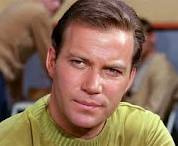
As I was cleaning off my desk at home, I unearthed a set of “Quotable” Star Trek cards my husband put in my Christmas stocking last year. Flipping through them, I was again reminded of how well Gene Roddenberry understood the human condition. Yes, the Enterprise was navigating through the stars, but the situations the crew confronted could have easily been encountered in Des Moines, Iowa or Birmingham, Alabama. The dialog written for the characters is just as universal, and timeless …
…for instance, in “The Corbomite Maneuver,” Captain Kirk says, “There is no such thing as the unknown, only things temporarily hidden, temporarily not understood.” Inherent in “temporary” is the idea that humans aspire to unhide, to understand, to know. This is the same drive Tennyson gives his version of Ulysses, who desires “To follow knowledge like a sinking star, Beyond the utmost bound of human thought.”
While the current rate of technological change may indicate this drive is active in the 21st Century, I worry that technology may be the only area where people, like Ulysses, are focusing unyielding aspiration for knowledge. Semester after semester I introduce students to works of literature they “don’t understand,” yet few of them have a real desire to do so. What they really want is a one sentence summary, not real understanding. I hear the same thing from my colleagues throughout the humanities. And what saddens me the most is that like Roddenberry’s characters, I know that knowledge of human beings, not machines, is the great hope for our universe. So, like every semester, I will go into my classroom with the hope that together my students and I will strive to unhide, to understand, to know.
…for instance, in “The Corbomite Maneuver,” Captain Kirk says, “There is no such thing as the unknown, only things temporarily hidden, temporarily not understood.” Inherent in “temporary” is the idea that humans aspire to unhide, to understand, to know. This is the same drive Tennyson gives his version of Ulysses, who desires “To follow knowledge like a sinking star, Beyond the utmost bound of human thought.”
While the current rate of technological change may indicate this drive is active in the 21st Century, I worry that technology may be the only area where people, like Ulysses, are focusing unyielding aspiration for knowledge. Semester after semester I introduce students to works of literature they “don’t understand,” yet few of them have a real desire to do so. What they really want is a one sentence summary, not real understanding. I hear the same thing from my colleagues throughout the humanities. And what saddens me the most is that like Roddenberry’s characters, I know that knowledge of human beings, not machines, is the great hope for our universe. So, like every semester, I will go into my classroom with the hope that together my students and I will strive to unhide, to understand, to know.

 RSS Feed
RSS Feed